Saleh Malas | Jana al-Issa | Diana Rahima
The current general Syrian scene is made up of a complex structure in which actors’ interests in various fields overlap in conjunction with changes in the organizational, administrative, political, legal, economic, and cultural structures inside the state and society. This is also in tandem with a changed relationship between Syrian society and its governing authority and their relation to the regional and international environment.
This state of complexity in Syria, which burst in 2011, requires conscious steps and tools to break it up into smaller concepts for easier understanding and analysis through objective criticism, questioning what was once considered given facts, and exclusion of what limits its recovery in the future.
The changes that occurred during the last decade in Syria have produced a high research capacity thanks to the information revolution and development of communication means which provided wider spaces for thinking, analyzing events, and studying future courses of the situation in Syria.
The research work produced in the last ten years of the Syrian revolution has influenced the lives of ordinary individuals apart from institutions that used to function under an authoritarian power, which prevented any systematic research activity from criticizing its policy and ways of handling the surrounding reality.
In this in-depth article, Enab Baladi highlights the work of research centers that emerged in the last decade and focused on Syrian affairs. It also discusses with Syrian researchers the impact of these centers’ work on public opinion, decision-makers, and the concept of research, after listing the most prominent research centers and the criteria for their work.
Inadequate funding
The frustrating reality of scientific research in Syria
Scientific research in Syria officially began in 1958 with the establishment of the High Council for Science, which consisted of specialized committees representing all interested parties and preparing scientific plans under the presidency of the Minister of Higher Education.
In 2006, the Higher Commission for Scientific Research (HCSR) was established under Legislative Decree No. 68 of 2006. The HCSR was mandated to plan scientific research in Syria, formulate its policies, coordinate research and studies among various Syrian research centers and universities, and approve the financial budget for scientific research.
The provision of funding sources for scientific research is of utmost importance, as it indicates the degree of credibility of research results and its acknowledgment as an effective tool for general advancement in Syria.
Moreover, investment in scientific research has proved promising if appropriately managed.
However, like other sectors, scientific research in Syria was controlled by the government, according to reports issued by the United Nations Economic and Social Commission for Western Asia (ESCWA) between 2010 and 2017.
According to the reports, fiscal expenditure on scientific research in Syria is very low and is covered mainly by government funding, which is difficult to estimate because this funding is not clearly mentioned in the annual financing plans of universities and research centers.
A 2019 report by ESCWA, which studied the reality of research work in Syria, said that the total public expenditure does not specify what has been spent on scientific research or the administrative and service sides.
Statistics on the amount of expenditure on scientific research vary; however, the percentage of 0.12% of the Gross Domestic Product (GDP) may be the most widely traded in various statistics on expenditure in this field before 2011. This percentage dropped below 0.04% after 2011.
The report showed that most research projects’ funding in Syria is governmental, while there is weakness in terms of private financing (local or international).
As for annual government budgets allocated to scientific and technical institutions and scientific research supporting funds, they are not fully spent, despite their limitedness.
For example, the fiscal year 2014 general budget proposed 0.14% of the total general budget for spending on scientific research in Syria, while in 2015, it only proposed 0.10% of the total general budget. Nevertheless, the percentage of expenditure was 0.02% for both years, according to ESCWA’s report, revealing a gap between what is planned and what is actually implemented in the research field in Syria.
Before 2011, Syria had only one research center licensed by the regime’s government, a report by the Lebanese Assafir newspaper mentioned in 2006. The Damascus-based Center for Studies and Research was the only official and authorized research center in all of Syria and was affiliated to the National Security Office, Syria’s highest security authority, constitutionally speaking.
Other research centers were allowed to conduct research only under their commercial registry instead of functioning as research studies centers.
The Center for Studies and Research in Damascus focused its studies on all that affects Syria’s national security. Its studies were kept confidential, viewed, and studied exclusively by decision-makers and senior officials.
Assafir cited the directors of research centers of various focus points, who said that many factors hampered the work of research centers before the Syrian revolution. These factors included the government’s refusal to grant licenses or financial support to these centers and the marginalization of researchers and their work.
Scientific research within the Syrian higher education system and research centers face several challenges, according to ESCWA’s report. Most prominent of these challenges are the low demand for scientific research as a result of weak linkages to the productive and service sectors, the non-acknowledgment of the importance of scientific research, the tendency to individualism in conducting research rather than working in well-formed and integrated teams, and the complexity and bureaucracy of research projects’ funding mechanisms, which thwart researchers from doing their work.

A young Syrian man reading a legal study on transitional justice in Syria in the Turkish city of Istanbul – 12 December 2021 (Enab Baladi)
A research boom after 2011, what are supporting factors?
Contrary to the reality of research work in Syria before 2011, the number of research centers interested in Syrian affairs increased remarkably after the Syrian revolution.
Today, there is open access to those wishing to analyze and research on a problem within the general situation in Syria, amid so many cases that can be searched from multiple dimensions. Moreover, there is a trend to support scientific research and encourage and train competencies.
An open space for free-thinking
The executive director of Omran Center for Strategic Studies, Dr. Ammar Kahf, told Enab Baladi that Syrian research centers had no real presence before the Syrian revolution for several reasons, including the regime’s control of the few research centers available at the time and the limitation of their work to specific files without going into real problems at the level of state and society structure.
Kahf added that other traditional research centers were linked to universities, and their work was affected by the bureaucracy of government institutions and their problems. These centers had no influence on the decision-making process because of the nature of policy-making in the regime’s government, “controlled by a specific group and security apparatus.”
Prior to 2011, Syrians were not allowed to think and plan for themselves because “other people were thinking for them,” Kahf said.
According to Kahf, the Syrian revolution created an open space for free thinking and interaction far from the regime’s authority over research centers. This gave room to research and studies centers to break the regime’s monopoly of scientific research and allowed them to investigate pressing issues in a realistic and accessible manner.
The revolution also highlighted the need for research centers to try to influence decision-makers in the Syrian file, given the complexity of the Syrian issue and the interaction between internal, regional, and international factors amid global studies and research centers’ panting to understand and explain what is happening in Syria.
An enabling environment and earmarked funding
The refugee and immigration situation outside Syria, which has been forced on or sought by research workers, has played an essential role in increasing the rate of establishing Syrian research centers or those interested in Syrian affairs, which in turn has contributed to creating an appropriate working environment for this sector allowing free and independent thinking.
Syrian researcher and Ph.D. holder in Economics and research director at the Operations and Policy Center (OPC), Karam Shaar, told Enab Baladi that the new working environment had encouraged Syrian researchers to publish their research without fearing tyrannical authority. This, in turn, helped increase the number of research initiatives that go hand in hand with the potential and needs of competent researchers.
Shaar stressed on the absence of a free and independent environment for research work in regime-controlled areas by referring to the fact that all centers producing useful and goal-oriented studies operate outside the regime’s areas.
Shaar also said that the numerous problems caused by the armed conflict in Syria reinforced the need for research centers to look into the details of these problems and provide solutions.
“Financial funding and support” facilitated the establishment of research centers that attracted researchers from various political, military, social, and humanitarian sectors, according to Shaar.
New players need a compass to guide their decisions
Senior research fellow at Omran Center for Strategic Studies and lead researcher at al-Sharq Forum, Sinan Hatahet, said that the Syrian revolution event itself calls for many political researchers to analyze its events and suggest ways to handle them.
Hatahet added that the revolution had led to the emergence of new players and actors within the Syrian opposition in the political, security, and economic arenas. These actors would depend on experts, analysts, and researchers to guide them through their studies in the decision-making process.
Hatahet linked the proliferation of research centers after 2011 to the need of political opposition groups to them.
He added that the lack of competition among entities studying Syrian affairs before 2011 had decreased awareness of the importance of research centers and their role in influencing public opinion and individuals’ behavior and intellectual orientation. Prior to the revolution, aspects of political life, even in its simplest forms, were non-existent in Syria despite the strong impact of public opinion on public policy that cannot be ignored in any society.
Hatahet pointed out that political forces need research centers to anticipate the consequences of certain decisions before issuing them; however, in totalitarian states, the ruling regimes make decisions without relying on research centers or their studies.
In addition, the information and communication technologies enabled the public to follow everything happening around the world moment by moment, making public opinion one of the factors influencing the decision-making process in democratic societies. In other words, public opinion commands the attention of world leaders, commanders, governments, institutions, and researchers.

A young Syrian woman holding a legal study on a Syrian issue in the city of Istanbul – 12 December 2021 (Enab Baladi)
Truth is the guideline for scientific research
Research work criteria vary from one center to another, depending on its nature. For example, the academic research process based on rigorous theory and methodology differs from the research process in think tanks and studies centers.
These criteria are also different in detail when it comes to western and eastern research institutes and the nature of research in terms of type or quantity, and even if general standards intersect somewhere, each study direction has its own specificity and criteria.
The search for the truth
Scientific research is the outcome of the efforts of a researcher who inspects, explores, analyzes, criticizes, and compares a subject to find or reach the truth. This process is different from attempting to prove a certain issue or its validity or to support some opinion consistent with the researcher’s vision or inclination, according to page12 of the “Research Methodology and Rules of Investigation” by Dr. Mahdi Fadlallah, Professor of Logic and Scientific Research Methodology at the Faculty of Arts – Department of Philosophy at the Lebanese University.
Thus, every scientific research is an open-ended project that seeks to increase and deepen knowledge and discover more problems that require solutions by using available information in an effective, innovative, clear, and accurate method, away from ambiguity and padding. This method interconnects ideas through reliance on logical analysis, reasoning, and scientific interdependence, to draw readers’ attention from the beginning till the end of the research.
Based on this description, research work addressing a new problem contradicts the attempts to prove hypotheses proposed by specific theories, as such hypotheses can never be held to be an absolutely correct answer to a question.
A healthy condition after decades of severe repression
Researcher Karam Shaar said that there should be no specific criteria or conditions for research centers or researchers, and perhaps one of the very few bright aspects supporting research work in Syria is the intellectual openness that followed the Syrian revolution.
Many centers label themselves as research centers, and many people refer to themselves as “researchers” and “there is nothing wrong with that,” according to Shaar, who added that in the end, it is the evaluation that counts.
When a research is published, most people would be unable to evaluate its overall quality because they are not qualified to carry out an accurate evaluation. However, a percentage between 5 and 10% of specialists or experts can evaluate the work of a research center or a researcher, as they are more qualified in terms of education and scientific competence.
Shaar added that it is only normal in the current phase in Syria, after four decades of severe repression under the authority of the Syrian regime, to have a state of intellectual and ideological fragmentation.
According to Shaar, it became challenging to agree on a unified description for research work, which is not necessarily an unhealthy case as this condition will constitute intellectual clusters and help the emergence of different schools and hypotheses for each subject.
The current surge in research on Syrian affairs is natural, after a long period of inability to express opinions at all levels, Shaar confirmed.
 The provision of knowledge contributes to collective awareness
The provision of knowledge contributes to collective awareness
Syrian research centers are a new phenomenon and a knowledge tool that society is still in the process of accepting and recognizing the role of their output in shaping the future collective consciousness.
Researcher Sinan Hatahet said that Syrian research centers are not at the same level regarding their influence on the Syrian audience. Some of these centers are merely concerned with events that matter only to a small segment of individuals and are, therefore, “a broad rubric or a legal cover for advocacy or lobbying work and do not fit the description of research centers.”
According to Hatahet, Syrian research centers that match the description “can be counted on the fingers of one hand” in reference to their very few numbers, despite the current availability of an appropriate environment for their existence.
Hatahet added that the impact of such research centers on individuals is not measured in general terms because ordinary individuals are not the main targets of these centers, but mainly those involved in decision-making and government or private institutions that have direct effects on the ground, such as Syrian opposition institutions and active governments in northern Syria, even if their practical effectiveness is in fact limited.
The levels at which the production of research centers associated with Syrian affairs meet the basic needs of individuals in the current period are varying, according to Hatahet, because the produced researches are not tackling a specific issue. Currently, societies in the four Syrian control areas are not in the position to make decisions and will therefore not be able to adopt specific policies based on the output of research centers.
Still, research centers are increasing individuals’ cognitive awareness and ability to better analyze and comprehend the general scene, Hatahet said, adding that collective consciousness of the details of events will produce future positive results in terms of identifying and making decisions related to public affairs within the Syrian regions.
The executive director of Omran Center for Strategic Studies, Dr. Ammar Kahf, pointed out that within the humanitarian crisis in Syria, the role of research centers became to address people’s needs as chronic problems that require reflection, analysis, and study of their effects, and provide logical solutions and recommendations that contribute to responding to those needs and to the rationalization of decision-making in addressing them.
Research centers should link the level of their impact to their ability to export objective reading that is in line with society’s basic needs and problems and present solutions; otherwise, they will be drifting away from the lived reality of ordinary people.
According to Kahf, research centers must coordinate and cooperate with various Syrian organizations to develop solutions at various levels, with a view to transforming politicized and highly polarized public space into programs of work and files that can be addressed within applicable national perspectives and procedural solutions.
Raising awareness: Research centers’ central function and objective
Research centers’ functions are determined by their nature. Academic research centers attached to universities have functions related to examining and developing theories and accumulating research output and references in certain disciplines.
While studies and policy centers, and think tanks are more specialized in influencing the decision-making process, through study papers that interact practically with the public sphere in its various disciplines and are based on presenting solutions, recommendations, and policies for decision-makers, according to Shaar.
Every interaction of any scientific output with public affairs would increase political awareness in several forms. This, in turn, varies according to the nature and objectives of research centers. Academic research centers work to raise political awareness through specialization, educational attainment, and direct education, especially within the framework of universities and social sciences disciplines.
Meanwhile, policy centers and think tanks work primarily to raise political awareness through tackling problems and matters relating to public affairs and producing outputs that analyze and dismantle reality and provide solutions and alternatives, in addition to the interaction of their members with society, whether through the media or seminars and workshops.
Shaar pointed out to Enab Baladi that research centers, in principle, increase political awareness depending on the quality of their works. The better the quality, the higher the political awareness, and in general, research centers encourage dialogue based on a scientific basis.
Opinion poll
Enab Baladi conducted an opinion poll on its official website and social media platforms on whether Syrian research centers have contributed or not in clarifying issues and subjects of matter to the Syrian people.
The poll was answered by 720 participants, 560 of whom said that research centers did not contribute in explaining issues related to the Syrian street, while the remaining 160 participants said that such centers raise the level of collective awareness of issues important to Syrian society.
Influence lies at points of intersection between Syrian and international agendas
Researcher Sinan Hatahet said that prominent research centers that alert decision-makers to how to make decisions away from improvisation that leads to falling into crises provide thoroughly audited and reviewed information and take long periods to complete a single research.
Government institutions that are not targeted by Syrian research centers or not addressed directly or explicitly are necessarily tracking and getting influenced by research outputs, according to Hatahet.
The impact of research findings on these institutions is not always positive but rather negative, as they tend to apply the opposite of research recommendations.
Some Syrian research centers address and try to influence decision-makers in the international community, “creating an imbalance because the same international decision-makers have research centers in their own countries and certain agendas in line with their security and political status. Points of intersection with the Syrian national agenda are not always present,” according to Hatahet.
Points of intersection between the international and Syrian agendas are where Syrian researchers can influence individuals and workers in research centers.
The future of research work in Syria
Competency and sustainable funding… Two central elements for continuity
Given all the above, “true” Syrian researchers seek to create tools to support positive change that enhances the work of different sectors in Syria, including politics, economics, education, society issues, and many others.
And perhaps ten years of work for research centers were “not enough” to achieve the impact for which they were established, amid sustainability threats associated with support and funding, on the one hand, and the involvement of people who are not as competent as the research field requires, on the other hand.
For research work on Syrian issues to continue in such circumstances, there must be above all more “competency,” according to Karam Shaar.
Shaar pointed out that the main problem with research work today is the presence of people who consider themselves researchers but are scientifically incompetent, adding that scientific qualification is not necessarily an insurmountable condition but one of the indicators to be taken into account when hearing a person claiming to be a researcher, while his or her actual abilities might be limited scientifically, cognitively, and analytically.
Researcher Hatahet stressed that the accumulation of knowledge of Syrian researchers and the insurance of their stability and independence in work through financial funding could secure the most prominent needs of research centers to continue their studies and research on the Syrian issue, which in turn will affect the future political forces following the fall of the Syrian regime.
For his part, Dr. Kahf said that the realization of the long-standing and multidimensional nature of the Syrian issue and the fact that change would not happen in a single moment in time, but rather through multisectoral action, requires Syrian institutions, such as research centers and civil society organizations, to plan for all future stages and to promote means of stability and sustainability, for the handling of the Syrian issue in all its stages requires the development of different tools and long-lasting strategy.
Dr. Kahf added that the current number of research centers interested in Syrian affairs is “very small” against the requirements of the present phase, adding that the current stage still requires “policy-making and solution development” centers in addition to theoretical research, as both types are necessary to bring about real change.
Kahf pointed out that policy research centers rely on practical methods and applied practices “for we lack experts, not amateurs,” as he put it.
Syrian research centers need certain elements to continue their work, most notably specialization, sustainability means, capacity building, and promotion of independent financing, as well as developing relations with Syrians first and then with non-Syrian experts and politicians.

A training workshop on “Reading Ottoman Archives” organized by the Harmoon Center for Contemporary Studies – 23 July 2019 (the center’s official website)
if you think the article contain wrong information or you have additional details Send Correction
النسخة العربية من المقال
-
Follow us :
Most viewed
- Al-Hijri escalates against Damascus: A "radical" government
- Governor of As-Suwayda signs understanding agreement with al-Hijri: Key details unveiled
- Turkey confirms continuation of its operations in northeastern Syria
- Al-Sharaa signs draft constitutional declaration
- Al-Sharaa forms National Security Council in Syria



















 A
A
A
A
A
A
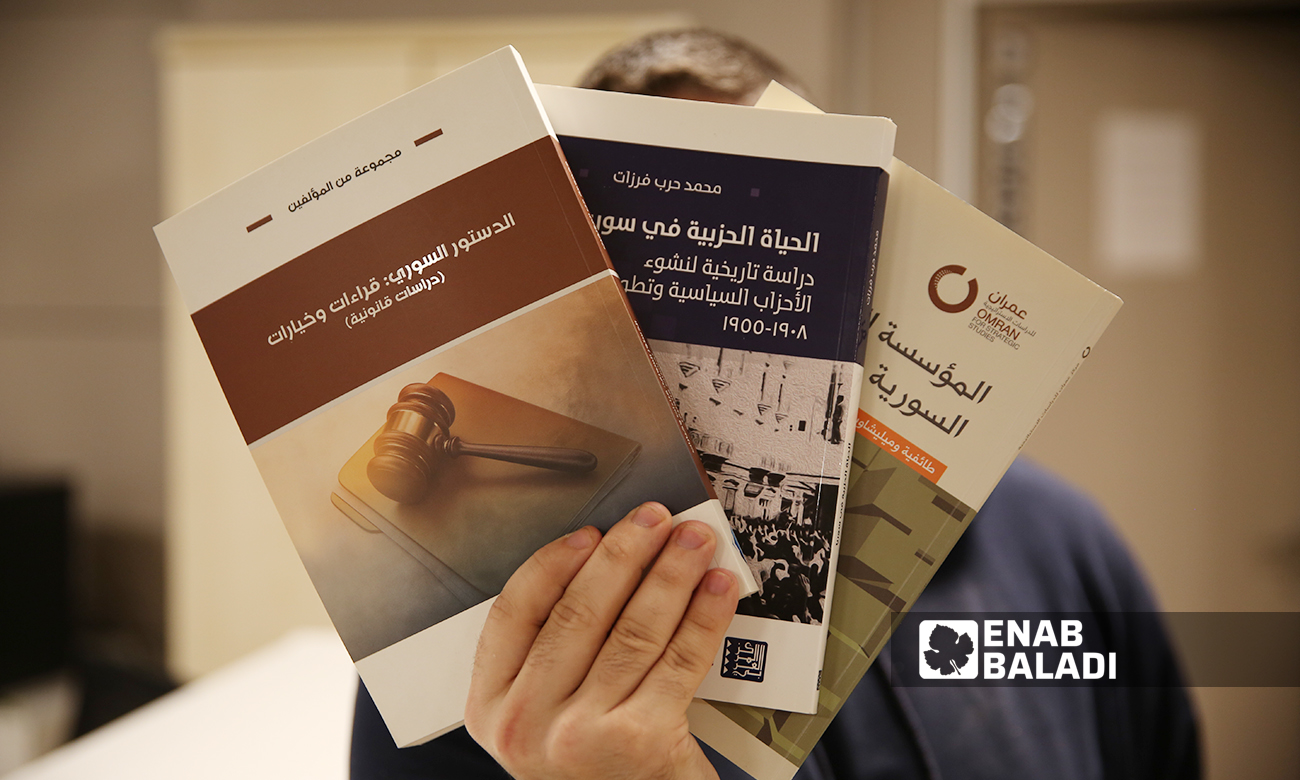




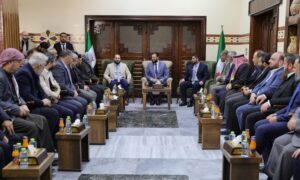
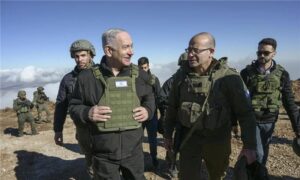
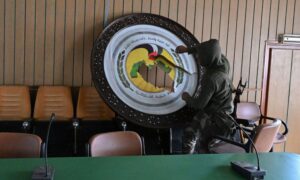
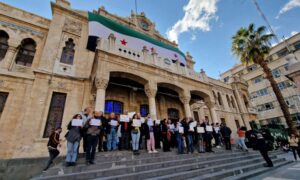
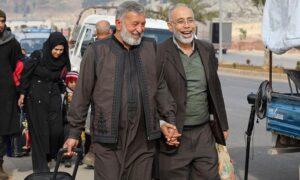
 More In-Depth
More In-Depth